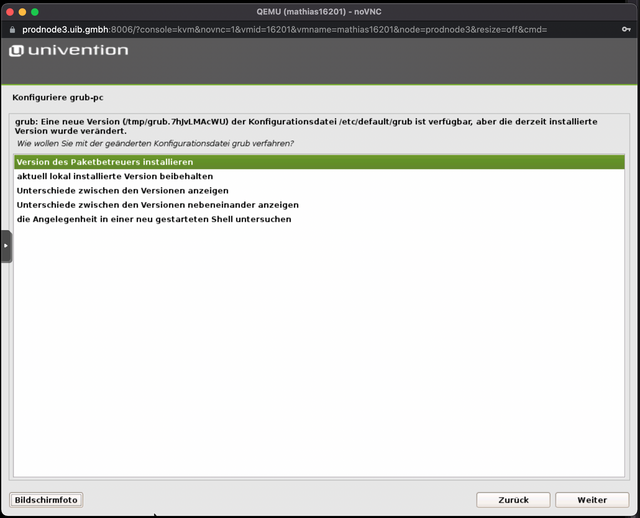Hi
we are currently looking into installing UCS 5.0-1 unattended.
We boot the opsi-linux-bootimage to patch some files for the installation and then integrate them into the initrd.
This worked fine until UCS 4.4
However now we have an issue with the nameserver within the target system inside the installer.
The installer itself runs fine and prepares everything it needs for the installation.
When it changes root to /target the URL updates.software-univention.de is not resolvable.
/etc/resolv.conf contains this uncommented line. The rest of the file is commented.
options timeout:2
EDIT: I checked the reolv.conf in /target. It was fine until some univention package installed and has overwritten the existing resolv.conf with the univention one without the nameserver
EIDTEND
checking with ucr shows that nameserver1 is not set.
When I set this manually with
ucr set nameserver1=IP
the installation will continue.
But this should also work with these preseed settings.
This is the uss part of the preseed
#
# Univention System Setup profile
#
univention-system-setup-boot uss/start/join string true
univention-system-setup-boot uss/hostname string #@hostname*#
univention-system-setup-boot uss/domainname string #@dns_domain*#
univention-system-setup-boot uss/server/role string domaincontroller_master
univention-system-setup-boot uss/ldap/base string #@ldap_base*#
univention-system-setup-boot uss/locale string #@locale*#.UTF-8:UTF-8 en_US.UTF-8:UTF-8
univention-system-setup-boot uss/locale/default string #@locale*#.UTF-8:UTF-8
univention-system-setup-boot uss/organization string #@organisation*#
univention-system-setup-boot uss/windows/domain string #@windomain*#
univention-system-setup-boot uss/interfaces/primary string #@ifdevice*#
univention-system-setup-boot uss/interfaces/#@ifdevice*#/start string true
univention-system-setup-boot uss/interfaces/#@ifdevice*#/type string #@if_setup_type*#
univention-system-setup-boot uss/interfaces/#@ifdevice*#/address string #@ipaddress*#
univention-system-setup-boot uss/interfaces/#@ifdevice*#/netmask string #@netmask*#
univention-system-setup-boot uss/interfaces/#@ifdevice*#/network string #@networkaddress*#
univention-system-setup-boot uss/interfaces/#@ifdevice*#/broadcast string #@broadcastaddress*#
univention-system-setup-boot uss/interfaces/#@ifdevice*#/ipv6/acceptRA string false
univention-system-setup-boot uss/gateway string #@defaultgateway*#
univention-system-setup-boot uss/nameserver1 string #@uss_nameserver1*#
univention-system-setup-boot uss/nameserver2 string #@uss_nameserver2*#
univention-system-setup-boot uss/timezone string #@timezone*#
univention-system-setup-boot uss/xorg/keyboard/options/XkbLayout string #@language*#
univention-system-setup-boot uss/ssl/organizationalunit string Univention Corporate Server
univention-system-setup-boot uss/ssl/organization string #@organisation*#
univention-system-setup-boot uss/ssl/email string ssl@#@dns_domain*#
univention-system-setup-boot uss/ssl/state string #@country*#
univention-system-setup-boot uss/ssl/locality string #@country*#
univention-system-setup-boot uss/packages_install string #@uss_packages*#
univention-system-setup-boot uss/packages_remove string
univention-system-setup-boot uss/components string #@uss_components*#
univention-system-setup-boot uss/ad/member string False
univention-system-setup-boot uss/root_password string #@rootpassclear*#
univention-system-setup-boot uss/update/system/after/setup string True
The #@PLACEHOLDER*# values are replaced correctlyy in the opsi-linux-bootimage
Regards
Mathias
